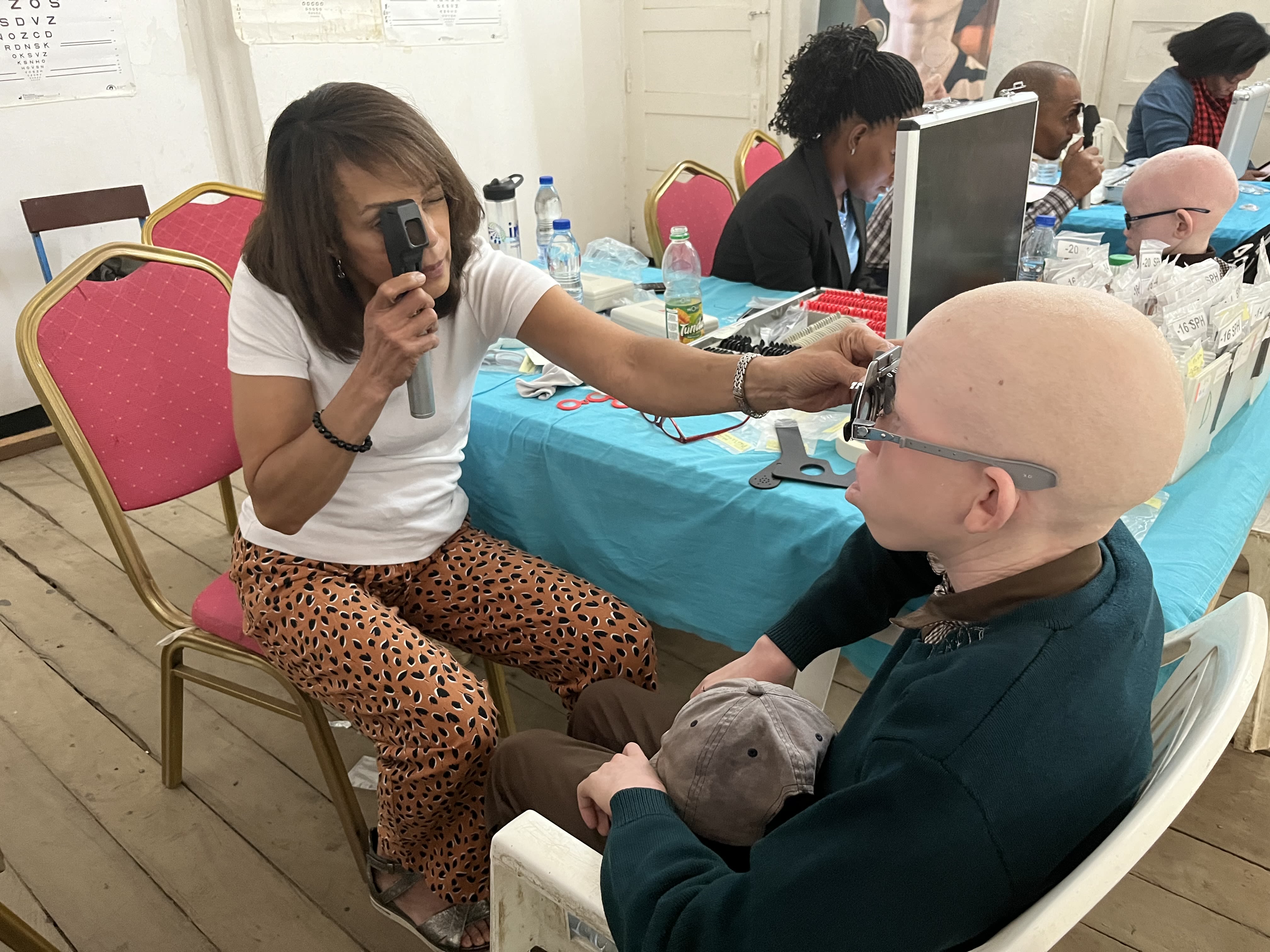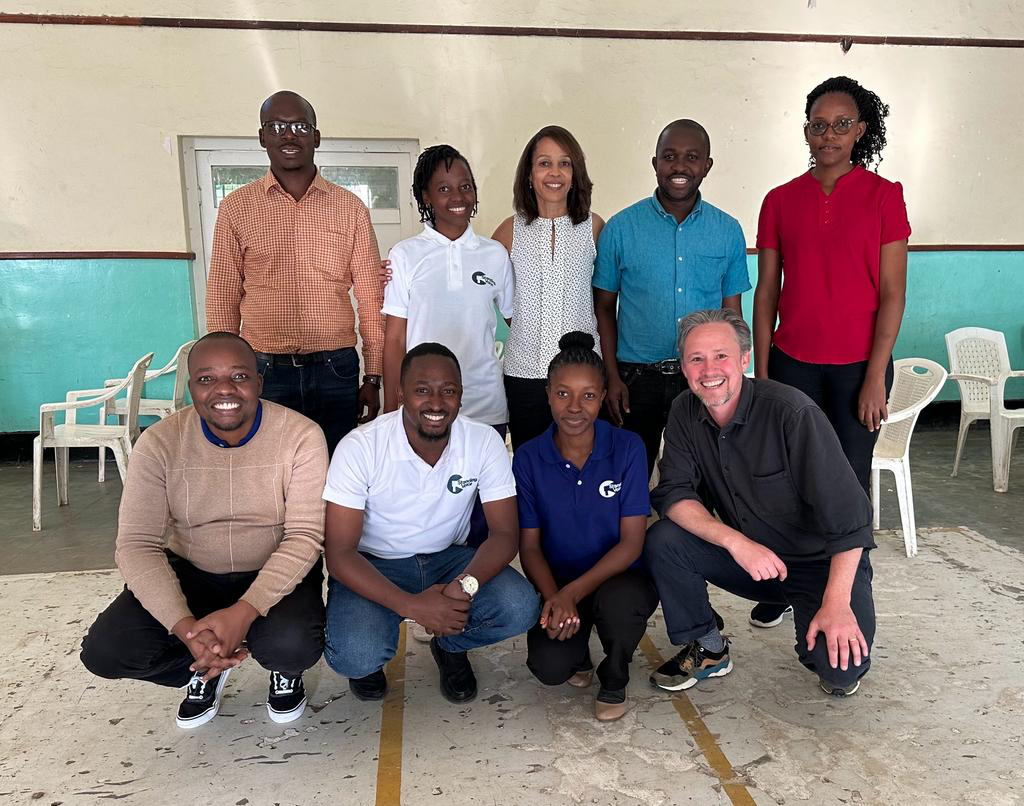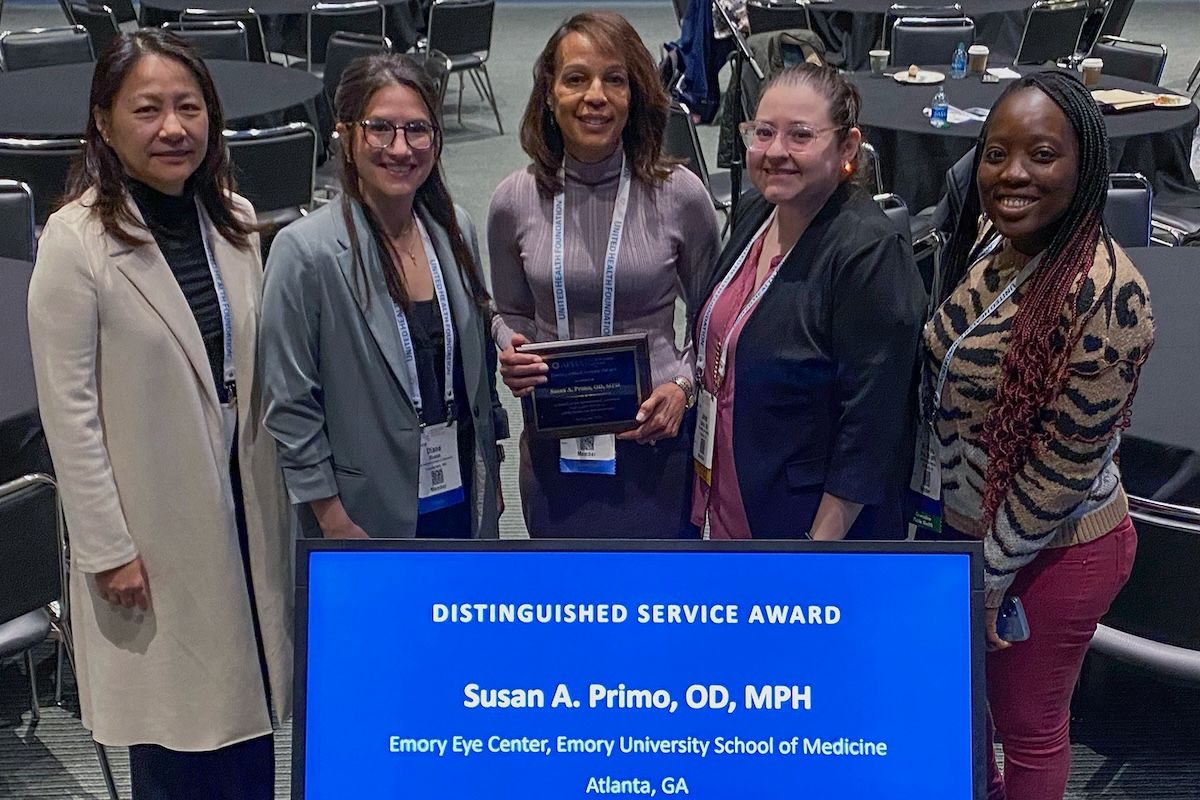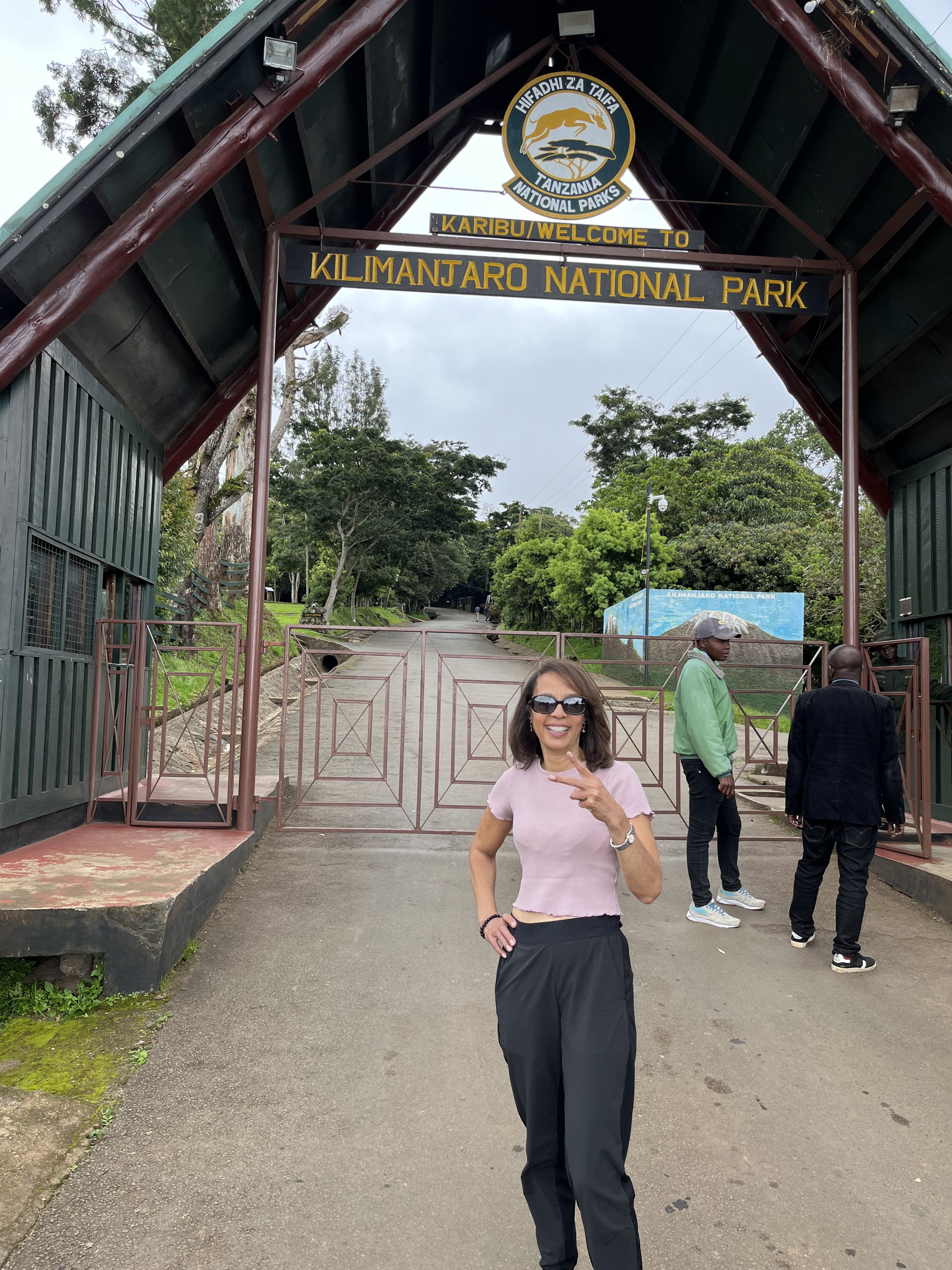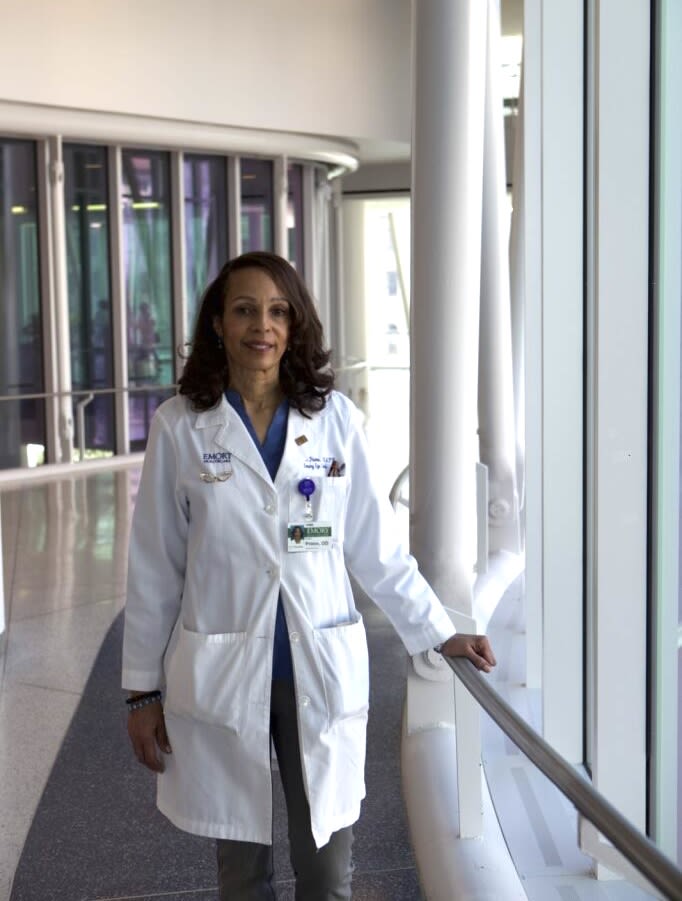Dr. Susan Primo Leads Efforts to Improve Vision Care and Public Health at Emory
The Emory Eye Center | Jan. 6, 2025
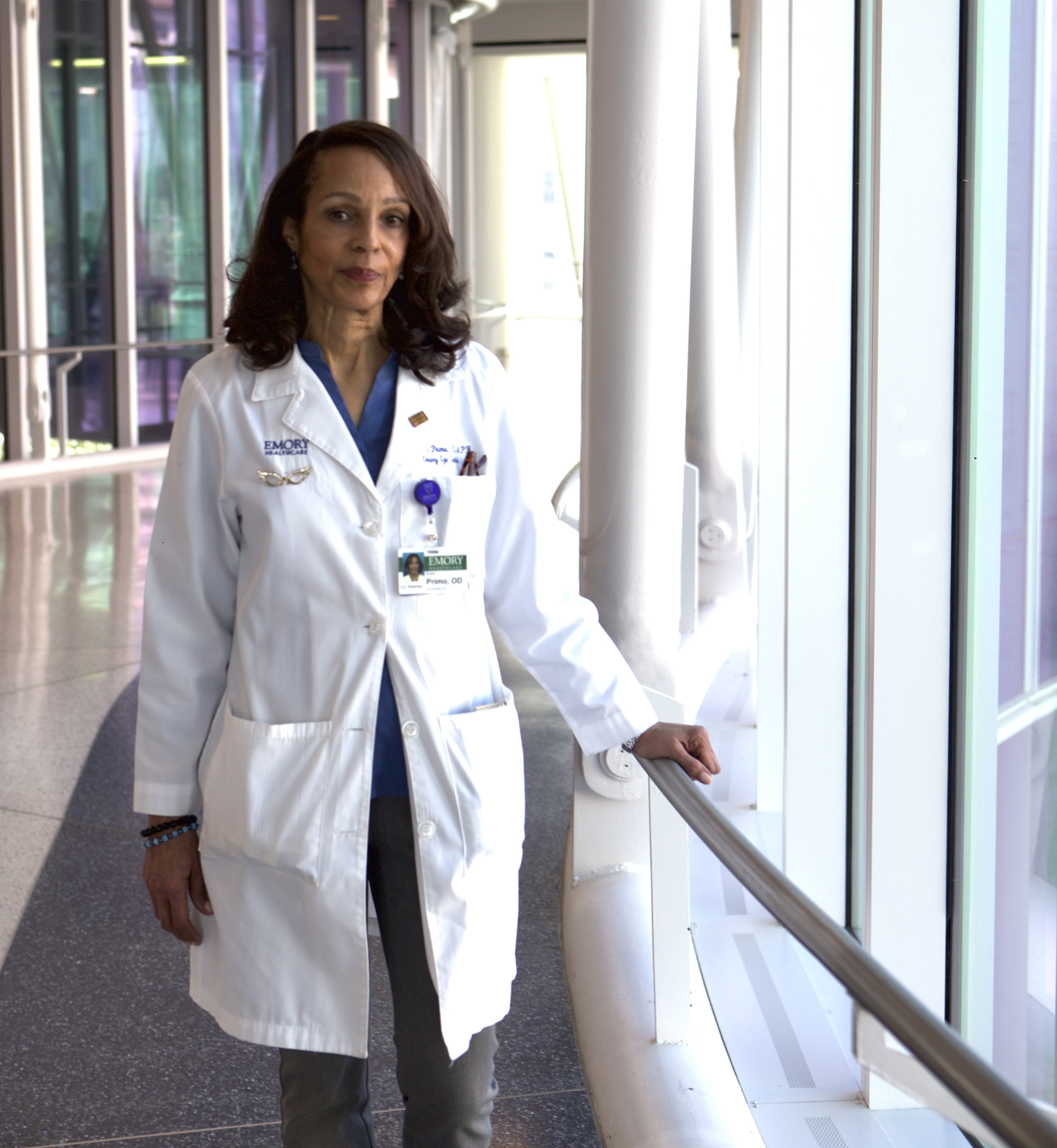
Susan Primo, OD, MPH, FAAO, has spent more than three decades at Emory, dedicating her career to improving patient care and advancing vision health research. Over the course of 32 years, Primo has become a central figure in the university's effort to serve underserved communities in Atlanta, combining her clinical expertise with a deep commitment to public health.
As the director of Optometry and Vision Rehabilitation Services since 2004, Primo has brought her background in public health to the forefront, her research centering on public health strategies to address visual impairment and vision loss—particularly from glaucoma—and on reducing racial disparities in vision care.
But Primo’s path to optometry and public health began long before she set foot in a research lab or optometry clinic. It was shaped in part by the example set by her father, an Episcopalian minister whose lifelong commitment to service left a lasting impression. As a child, Primo would often accompany him on hospital visits, where she was exposed to the everyday realities of health care and in so was inspired to follow a similar path.
“I’ve watched my family—whether through civil rights work or the homeless shelter for women and children my dad founded in Chicago (The Primo Center)—carry on a tradition of serving others,” Primo says. “It’s who we are. It’s in our DNA.”
Yet, it was one particular moment at the age of 15 that set her on the path to optometry. Accompanying her father to an eye exam, Primo was struck by the idea that you could actively help to improve a patient’s eyesight was a pivotal realization. The visit was monumental in her path to optometry, from her father’s increased vision after the visit, to the intricacies presented by the dials and numbers on the various medical equipment.
“I remember looking at the dials and numbers on the medical equipment, thinking, 'This is fascinating. This is something I want to understand.'”
That moment set her on a path that would lead to a distinguished career in optometry. The very same optometrist who had examined her father would later become Primo’s mentor, guiding her through college and optometry school.
Shaping a Career in Public Health
An Emory Eye Center employee, Dr. Primo spends 3 1/2 out of 5 days a week serving patients at Grady Memorial Hospital’s neighborhood health clinic called Kirkwood Family Medicine. Run by the city of Atlanta in partnership with Emory University School of Medicine, Grady is the 10th-largest public hospital in the United States and Atlanta’s only Level I trauma center.
Dr. Primo notes that many patients at Grady and its clinics are at high risk for preventable forms of vision loss, such as glaucoma and diabetic retinopathy. However, a significant number simply need basic eyeglasses – and do not have readily available access to information on how to improve their eye and vision health.
“Often, eye care takes a backseat to other medical conditions patients are dealing with,” she explains. “My role is to bring it to the forefront with regular eye care. I always tell my patients, ‘Nobody goes blind on my watch!’ But they do need to follow my instructions, including attending all follow-up visits and adhering to prescribed eye drops or therapies.”
She has been instrumental in expanding the role of optometry within the department and ensuring excellent interprofessional relationships, which she believes are crucial to the department's success.
“At Grady, I can count many, many patients who would have potentially gone blind without my presence and the quality of care provided there.”
With a Doctor of Optometry degree from New England College of Optometry and a master's in public health from Emory’s Rollins School of Public Health, Primo can identify two experiences as a student that shaped her career in public health. First, as part of her clinical training, every student was required to complete two rotations at a Federally Qualified Health Center (FQHC). At the time, Dr. Primo was unfamiliar with FQHCs, but she quickly learned how these centers serve as safety-net health care facilities designed to meet the needs of medically underserved populations in at-risk communities.
FQHCs reduce barriers for the uninsured and underinsured by offering a sliding fee scale, ensuring that no one is turned away for care. They also address transportation challenges by being located within neighborhoods and providing culturally sensitive services. Low-income populations, racial and ethnic minorities, and rural communities often experience higher rates of preventable vision impairment and have less access to care. By integrating eye and vision care into community health initiatives, particularly within health centers, these disparities can be reduced.
Second, Primo spent concentrated training at the Eastern Blind Rehabilitation Center at the Veterans Administration Medical Center in West Haven, CT. There, she honed her low vision rehabilitation skills with patients in a 6-week residential program who were visually impaired – working as a truly multidisciplinary team with other providers, occupational therapists, orientation and mobility instructors, among others. With the veterans residing in-house, Dr. Primo could continuously monitor their progress and help devise new strategies to maintain independence and improve the quality of life of patients there.
Dr. Primo credits these educational experiences with shaping who she is today. Her career continues to focus on the hard-fought battle to reduce preventable blindness in at-risk communities. And, if individuals do become visually impaired, Dr. Primo is well-equipped with the skills and expertise to help them navigate the next stage of their journey.
Dr. Susan Primo providing an eye exam at clinic.
Dr. Susan Primo providing an eye exam at clinic.
Group photo of Dr. Primo and clinic staff during global ophthalmology efforts.
Group photo of Dr. Primo and clinic staff during global ophthalmology efforts.
Dr. Susan Primo receiving an award for Distinguished Service at the Emory Eye Center.
Dr. Susan Primo receiving an award for Distinguished Service at the Emory Eye Center.
Continuing Research
Dr. Primo’s commitment to collaboration extends beyond the clinic. She is involved in numerous projects and frequently works with researchers from Georgia Tech, contributing to research focused on digital media for assistive technology. Her work also aims to develop accessible communication tools for blind and low-vision patients.
While some of the research is proprietary, Dr. Primo never turns down a consultation when a Georgia Tech researcher reaches out. She believes that collaboration between researchers and clinical eye and vision care providers is essential for driving innovative discoveries that benefit patients. Often, she helps break down clinical aspects of research, facilitating the progress of these innovations.
Emory’s Vision Rehabilitation Service remains at the forefront of clinical trials and novel strategies designed to enhance the quality of life and visual function for visually impaired patients. As patients receive care from the Emory Eye Center, they directly benefit from this cutting-edge research. They are often the first to experience new testing methods, tools, and strategies, made possible through collaborations with outstanding researchers at both Emory and Georgia Tech.
Life as a director
Wielding a unique perspective as a member of the administrative leadership team at each location, Dr. Primo notes that there are significant differences in the patient populations served, making it critical to understand each environment through hands-on experience.
Each clinical location shares a fundamental mission: to care for patients' eyes, ranging from basic comprehensive care to subspecialty medical and surgical treatment. However, there are often unique nuances and challenges at each site that must be addressed.
“I am most proud of the role optometry has played in each healthcare system, and we are truly an integral part of eye care delivery in metro Atlanta and beyond,” Dr. Primo said.
Hired as the second optometrist in 1992, Dr. Primo has helped expand the team to 15 clinicians, supporting services from general eye care to glaucoma treatment and specialty contact lenses. Recently, the Emory Eye Center added an optometry residency program, which provides optometric faculty with opportunities for greater engagement in teaching.
The program also offers an excellent training experience for residents, who receive advanced training beyond the four years of optometry school, including specialized instruction in medical contact lenses. The volume and complexity of diseases and conditions that Emory residents encounter make it one of the leading programs in the country.
In addition, Dr. Primo has taken on a new role consulting for the global advisor of the Low Vision-Inclusive Health initiative with the Christian Blindness Mission (CBM). This initiative aims to bring equitable access to care for people with visual impairments worldwide, with a recent focus on establishing low vision rehabilitation clinics in Nicaragua.
“I am committed to ensuring that every visually impaired student and person has access to the assistive technology they need to succeed—not just glasses and basic tools,” Dr. Primo said.
Her work continues with training optometrists to examine people with visual impairments, particularly those with albinism. She is dedicated to ensuring that students with albinism have the resources they need to succeed academically and become productive members of society. Dr. Primo highlights the ongoing stigma faced by people with albinism, especially in Africa, where it has become a significant human rights issue. She is determined to expand her efforts and looks forward to reaching as many students and adults as possible, with plans to extend her work to Malawi, another African country with a high prevalence of albinism.
Dr. Primo posing for a photo at Mount Kilimanjaro National Park, Tanzania, on a ophthalmology clinic trip.
Dr. Primo posing for a photo at Mount Kilimanjaro National Park, Tanzania, on a ophthalmology clinic trip.
Dr. Susan Primo at Emory Hospital, Clinic Building B.
Dr. Susan Primo at Emory Hospital, Clinic Building B.
Dr. Susan Primo on paper
Dr. Primo is widely regarded as an expert in low vision and vision rehabilitation research, as well as in addressing visual health disparities. She is an active member of several national panels and boards dedicated to developing strategies and policies to reduce visual impairment among at-risk populations. Dr. Primo is a member of the National Eye Institute's National Eye Health and Education Planning Group and co-chairs the Center for Vision and Population Health at Prevent Blindness America. She also serves as a reviewer for numerous grant panels focused on vision impairment and the prevention of vision loss.
In addition to her national contributions, Dr. Primo participates in global ophthalmology initiatives, including GAVision 2020 and Standing Voice service visits to Tanzania. She is a passionate advocate for integrating eye and vision care into primary care, particularly through on-site delivery models at community health centers.
Dr. Primo was named Optometrist of the Year by the National Optometric Association in 2005 and has received numerous accolades for her outstanding community service. In 2021, she received the Distinguished Alumni Award from the New England College of Optometry, followed by the Distinguished Service Award from the American Public Health Association in 2023. Dr. Primo is a fellow of the American Academy of Optometry and has lectured extensively at both local and national conferences.
To learn more:
Please visit Emory Department of Ophthalmology and Emory University
About this story: Published Jan. 6, 2025. Written and designed by Ruby Katz.

